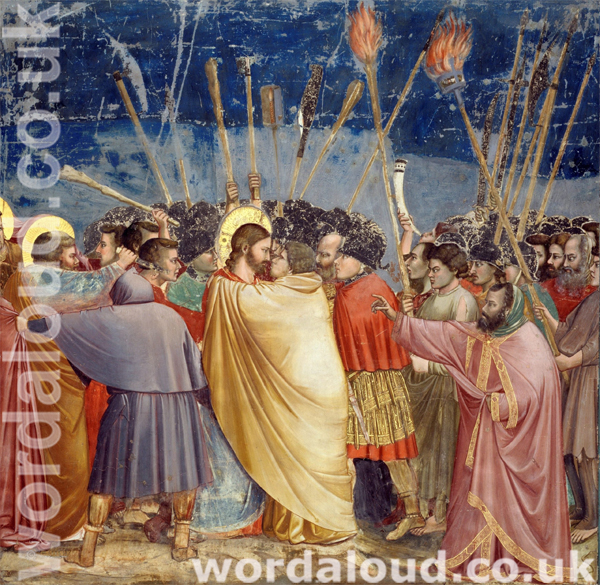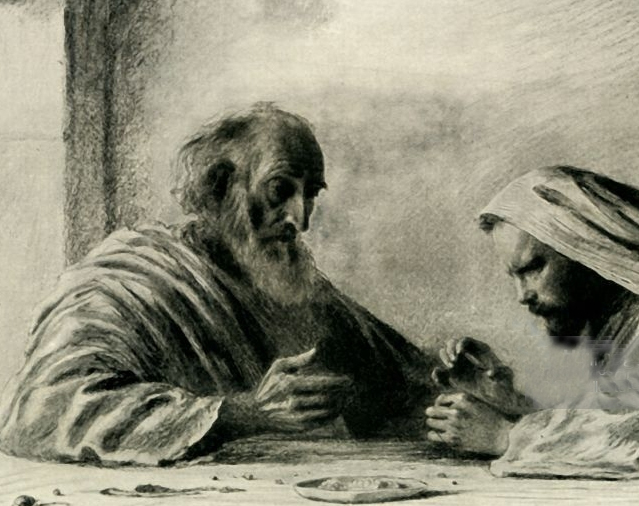Christian Art | Jesus In The Garden Of Gethsemane | The Judas Kiss
Office Of Readings | Week 28, Monday, Ordinary Time | A Reading From The Treatise Of Saint Flugentius Of Ruspe Against Fabian | Sharing In The Body And Blood Of Jesus Christ Sanctifies Us
‘We are made holy by our sharing in Jesus Christ’s body and blood.’
Saint Fulgentius of Ruspe sets out a theology of the Eucharist grounded in the words of Saint Paul: ‘Do this in remembrance of me.’ He presents the Eucharist as the means by which the Church continues to proclaim the death of the Lord until his return. The sacrifice of Christ, offered once for all, is made present in the Church’s act of remembrance. The liturgy is not a repetition but a participation in that one sacrifice.
Fulgentius links this remembrance to transformation. The faithful do not recall Christ’s death as an event of the past; they enter into its effect. The act of offering the Eucharist involves the imitation of Christ’s obedience and self-giving. Through the Spirit, believers are joined to Christ’s death to sin and his life to God. The Eucharistic mystery therefore includes both the offering made to God and the change worked in those who share it.
For Fulgentius, the sharing in the body and blood of Christ signifies a way of life. Those who receive the sacrament are to live as those who have died to the world. The Eucharist forms a community that keeps its life ‘hidden with Christ in God’. To share in the sacrifice is to be shaped by it.
He describes this change in terms of love. The death of Christ was an act of love; the same love is given to believers through the Spirit. The Eucharist communicates that love and binds those who receive it into unity with one another. The love that is celebrated at the altar is to be lived in conduct. Without it, even the greatest acts lose meaning.
The text also directs attention to the Church as a body. Each person who prays or offers the sacrifice does so as a member of the whole. The sanctification of one supports the sanctification of all. The Eucharist thus expresses both the unity and interdependence of the faithful.
Saint Fulgentius’ account presents the Eucharist as the centre of Christian existence: the place where remembrance, participation, and mutual belonging are joined in the one act of Christ’s body.

A Reading From The Treatise Of Saint Flugentius Of Ruspe Against Fabian | Sharing In The Body And Blood Of Jesus Christ Sanctifies Us
In our offering of the holy sacrifice we fulfil the command of our Saviour, as recorded by the apostle Paul: The Lord Jesus, on the night in which he was betrayed, took bread, and after he had given thanks, broke it and said: This is my body, which is for you. Do this in remembrance of me. In the same way after the supper, he took the cup saying: This cup is the new covenant in my blood. Do this, whenever you drink it, in remembrance of me. For as often as you eat this bread and drink this cup, you shall proclaim the death of the Lord until he comes.
This sacrifice is offered, then, to proclaim the Lord’s death: it is offered in remembrance of him who laid down his life for our sake. As he says: Greater love than this no one has, that one lay down his life for his friends. Because Christ died for us out of love, we ask, when we make remembrance of his death at the time of sacrifice, that we too may be granted love through the coming of the Holy Spirit. We pray that by the love which Christ had for us when he braved the cross, we may receive the grace of the Spirit and be crucified to the world, and the world to us. The death Christ died, he died to sin, once for all, but the life he lives, he lives to God. Let us imitate our Lord’s death, and also live a new life. Strengthened with the gift of his love, let us die to sin and live for God.
For God’s love has been poured out in our hearts through the Holy Spirit, who has been given to us. Indeed our sharing in the Lord’s body and blood when we eat his bread and drink his cup teaches us that we should die to the world, and that we should keep our life hidden with Christ in God, crucifying our flesh with its vices and evil desires.
That is why all the faithful who love God and their neighbour truly drink the cup of the Lord’s love even though they may not drink the cup of his bodily suffering. And becoming inebriated from it, they put to death whatever in their nature is rooted in earth. They clothe themselves with the Lord Jesus Christ and do not indulge fleshly desires. They do not fix their gaze on visible things, but contemplate things which the eye cannot see. Thus they drink the Lord’s cup by preserving the holy bond of love; without it, even if a man should deliver his body to be burned, he gains nothing. But the gift of love enables us to become in reality what we celebrate as mystery in the sacrifice.
Christian Prayer With Jesus
Lord Jesus Christ,
who commanded your disciples to do in remembrance of you
what you once did for them,
grant that as we share in your body and blood
we may also share in your death to sin and your life to God.
May your Spirit shape us into one body
and sustain us in the bond of peace and love,
so that the sacrifice we offer
may be made complete in our lives.
Amen.
Glossary Of Christian Terms
Eucharist – The sacrament instituted by Christ at the Last Supper, in which bread and wine become the body and blood of the Lord.
Remembrance – In biblical and liturgical use, not a mere act of memory but a re-presentation of a saving event, making it present and effective.
Sacrifice – The self-offering of Christ on the cross; in the Eucharist, the Church participates in that one sacrifice through thanksgiving and praise.
Sanctification – The process by which believers are made holy through the grace of the Holy Spirit.
Body of Christ – A term used both for the Eucharistic presence of Christ and for the Church as a community united in him.
Communion – The sharing in Christ’s body and blood which brings about unity with God and with one another.
Love (Charity) – The divine love given by the Holy Spirit, uniting the believer to God and to neighbour.








